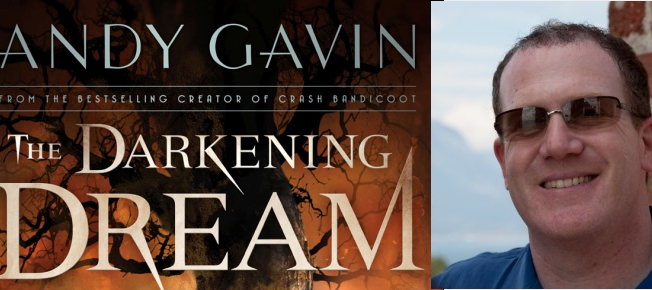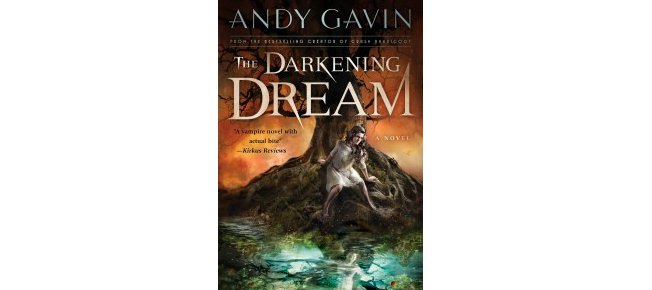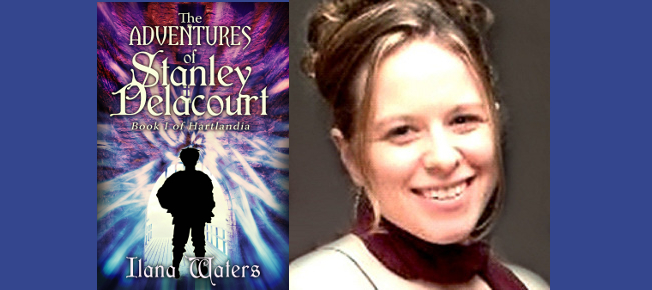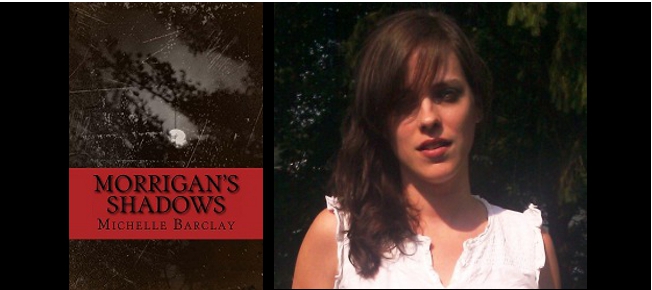From forming a gaming industry frontrunner to penning a fantasy novel, author Andy Gavin has taken on a number of creative endeavors. In the interview that follows, we talk to Andy about the journey to becoming a first-time novelist, his dark fantasy tale The Darkening Dream, and his views on self-publishing. Enjoy!
Hi Andy. We’re here to specifically talk about your novel The Darkening Dream, but before we get into that I’d like to discuss Andy Gavin the author. You’re probably best known for being a co-founder of video game studio Naughty Dog. Can you tell us a bit about the journey that took you from there to becoming an author? When and how did your interest in writing begin?
From at least high school on I always intended to write a bunch of novels. Work just got in the way.
And the thing about making games is that you can no longer do it mostly by yourself. These days, most games are big teams of over a hundred people, with budgets over 50 million dollars. It’s no longer about your creative expression (most of the time), but about getting it done well, on time, and on budget. And the role of team lead is largely about fire fighting and resource (achem… people) wrangling.
So, I really wanted to focus directly on the creative aspects. Dozens of story ideas have been bouncing around in my head for years, and I felt it was time to let a couple of them out.
Have there been any times where you began to doubt your future as an author?
Of course. Fundamentally I believe in the strength of my writing and I get enough positive feedback to support that, but novels have a visibility problem. There are hundreds of thousands published every year and only a few rise to popularity. I’m pretty confident that a lot of people who read my books will love them, I just worry that not enough will find them.
Have you considered going back into game development?
I occasionally evaluate what that might mean. I love video games. They are also very creative, and it’s a bigger industry dollar-wise. But games today are also large projects that take a lot of money and people to get started.
You’ve had a lot of interests over the years and you seem to really dive into whatever creative field it is you’re currently working in. Knowing that, I’m curious if you have any opinions on the self-publishing scene?
I never do anything halfway. So in 2010 I read about 20 books on publishing and query writing and spent hundreds of hours researching and querying agents. Since I’ve self published one book and also have a real literary agent (my second book is on submission to New York) I know a bit about both.
The traditional route is all about waiting and bashing your head against a wall. You query and query, investing time and emotional currency, only to get back very little feedback. I eventually landed a great agent, although it took two books to do it. Then you submit and wait and also get very little feedback. With self publishing you have control of your destiny. I think with The Darkening Dream I made an A quality product. It’s heavily edited and proofed, professional typeset, and has a brilliant cover by acclaimed fantasy artist Cliff Nielsen. I have a great Kindle edition, a beautiful trade paperback, and a gorgeous hard cover edition (rare for an Indie book). But the marketing and sales arena is new and constantly shifting. There is no guaranteed way to get it out there and advertising is not very effective for novels. So you have to be creative and lucky.
Let’s talk about your first novel, The Darkening Dream, which released earlier this year. It’s a dark fantasy novel set in early twentieth century Salem. What made you settle on both the genre and the time period?
When I started writing the book I wasn’t thinking YA/adult, I was just thinking about my story. I find this age based slotting to be a recent and artificial construct of the big chain bookstores and marketing departments. Regardless, I like to read books with young protagonists, and you write what you like to read. In some ways, the meta idea of The Darkening Dream is a twisted gritty historic reinvention of Buffy the Vampire Slayer (which is my favorite television show of all time). I wanted to emulate the angst and wonder factor of dealing with newly discovered weirdness as a young person, but also ground the entire story in researched and “real” magic and occult, and “sell” it via a very hardboiled and matter of fact style.
As a history buff, I’m always thinking, “that could have been so much better if they didn’t make up the historical backstory” so I started with the villains. What kind of ancient evil creatures might still be around? What do they want? And what legitimate human reason would they have to destroy the world (which is so Buffy)? I don’t exactly answer the question in TDD, because the motives of 5,000 year old baddies should be mysterious. But trust me, they have a plan, and the sheer audacity of it will literally shake the foundations of the heavens.
The focal point of the novel is Sarah, a young girl coming of age and fearing the pressures of what that brings. Were there any challenges in writing a young, female lead from that time period?
I chose 1913 for a number of reasons. I wanted a time before mobile phones and the internet and a time when people’s knowledge of the world left a little more room for mystery. Additionally, as I always intended this as a series with long lived (achem… immortal) characters, I wanted some runway to cross through history. I also loved the idea of a “vampire in the trenches” so I stuck it right before World War I.
Fundamentally, I think I settled on a female protagonist because of contrast. A bookish female is the less expected character in the role of budding sorcerer and central pivot. I enjoyed trying to get inside the female head. They’re more exotic and foreign. I like exotic and foreign.
There are a lot of different supernatural elements to The Darkening Dream. Did you have any particular literary or religious influences that helped shape the story you created?
The book has a bunch of themes, but one of the overriding ones is the relativity of belief. Each religion, and even esoteric belief structure, has its own lens through which to view the world. I wanted to envision a system that made real the myriad magical and supernatural ideas people have historically held. But how to properly envision a world in which vampires, the Archangel Gabriel, witchcraft, and Egyptian gods all exist? Many writers might just toss them together arbitrarily, but I wanted to find a framework consistent with traditional mysticism. Having read hundreds of religious and magical texts I have identified numerous consistencies in the thought patterns of the esoteric mind. I have a more extensive write up on my magical researches here.
What was the experience like finally getting that first book out the door? Relief? Fear? Triumph?
After nine or more drafts, total exhaustion. Like a game release, it was very anticlimactic.
Judging by Amazon and other sources, the reviews seem overwhelmingly positive. Do you feel like that’s an affirmation that you’re doing just fine? Is it inspiring you to try even harder? Basically, what’s your reaction to the feedback you’ve received?
Reviews have been great. About 50 professional and blog reviews have been posted and eighty-seven on Amazon. The overwhelming majority are positive, even some going as far as to say it’s one of their favourite books ever. A few people love the book but don’t love the ending. But even Publishers Weekly, notoriously hardass, gave it a starred review and said, “Gorgeously creepy, strangely humorous, and sincerely terrifying tale.”
It’s gratifying that a lot of people seem to get what I was trying to do with the book and enjoy it.
What audience do you feel like your novel is targeted at? Who do you feel would get the most enjoyment out of it?
The book has a couple different audiences. At one level it’s a fast paced horror story packed with action, pretty solid characters, and even a bit of dark humor. I tried to marry a fairly hardboiled realistic tone with some pretty wild and dark stuff. The overall effect is pretty creepy and should appeal to those that like HBO fantasy dramas (True Blood, Carnivàle). There’s also a lot of interesting history and religious and occult detail in there which appeals to an older more historically oriented audience. But I tried not to ever let it bog the story, which (at Renni’s insistence) just moves and moves. Finally, the book has young characters and some romance for the younger fan of urban fantasy (Laurell K. Hamilton, Kim Harrison, Jim Butcher).
You’ve already been hard at work on your next novel, Untimed. In what ways has the writing process for that novel benefitted from your experiences writing The Darkening Dream?
I learned a tremendous amount while writing (and more importantly revising) The Darkening Dream. I used these lessons to make Untimed a stronger and more sellable novel. In early drafts TDD was too long and too unfocused, so for Untimed I chose a single first-person point of view. This helped focus the book. I also worked to make this voice unique and individual from the start. It’s unclear how much this matters to readers, but agents and editors love “voicey” prose. And perhaps most importantly, I went with a more high concept story that begins with a big hook and a dramatic inciting event in the first chapter.
Do you have any advice for up-and-coming authors out there?
Read, read, write, write, edit, edit, edit. And hire good professional help too. Friends and family can give you a sense of how the book reads, but they can’t usually tell you how to fix anything serious. I’ve read a lot of half-decent Indie books on my Kindle that are at their core good, but just need some serious tightening and polish. Hell, I’ve read plenty of big-six bestsellers you can say this about.
Thanks for taking the time to talk to us today.
If you’re curious about The Darkening Dream, you can read the first couple of chapters for free via the official website. For updates on Andy Gavin and his future projects, be sure to Follow him on Twitter and Subscribe on Facebook.
© 2012 – 2013, The Indie Mine. All rights reserved.






Thank you so much for taking the time for the interview!